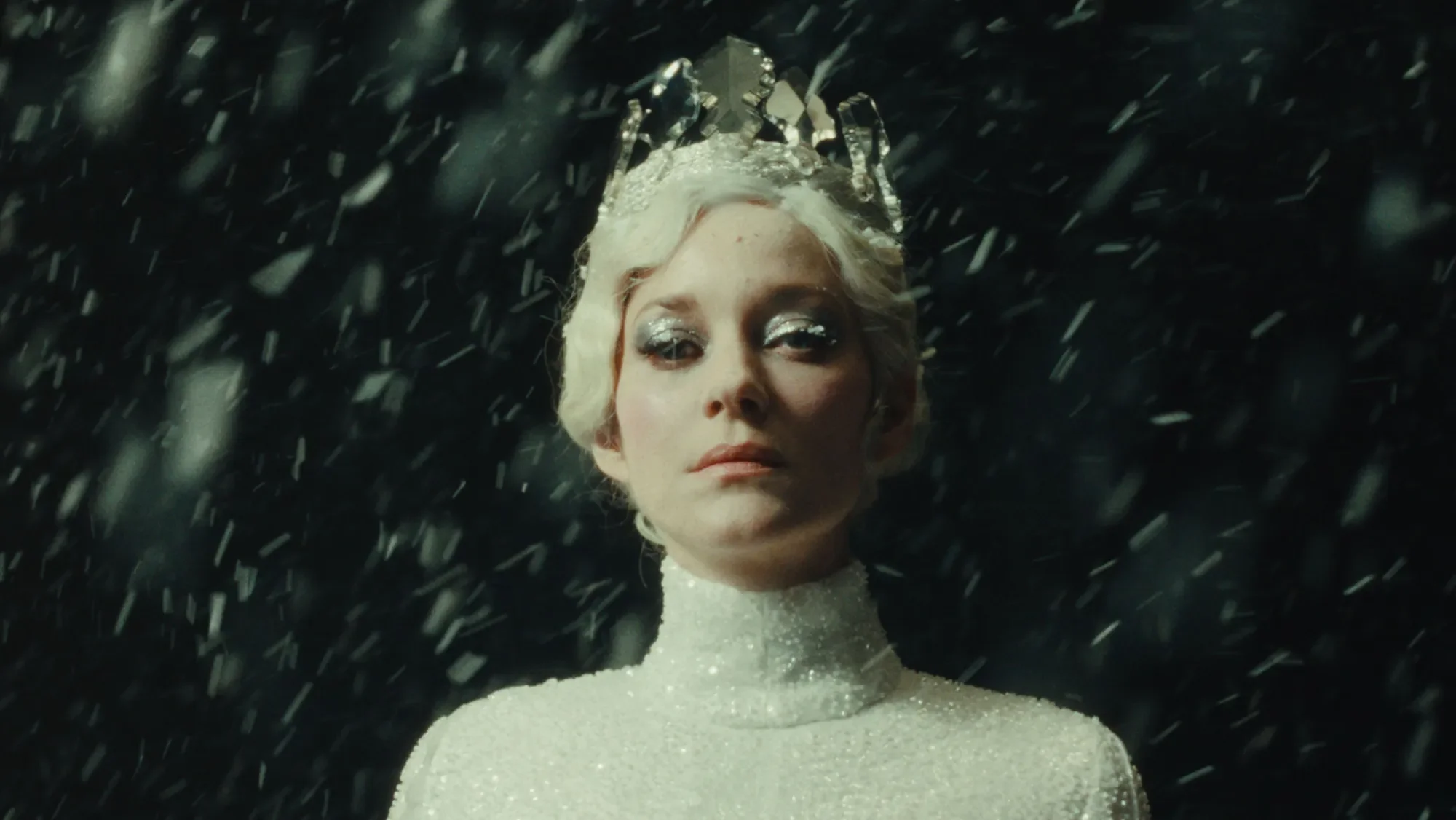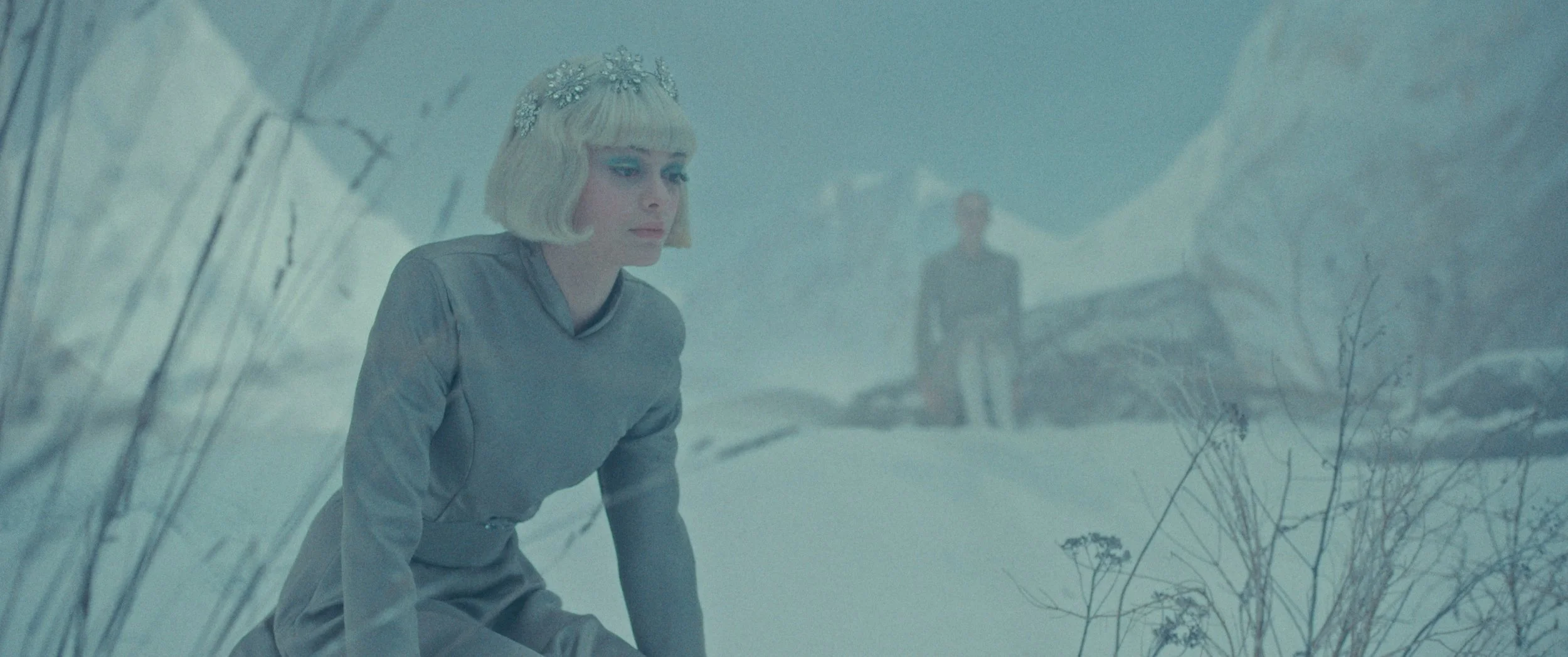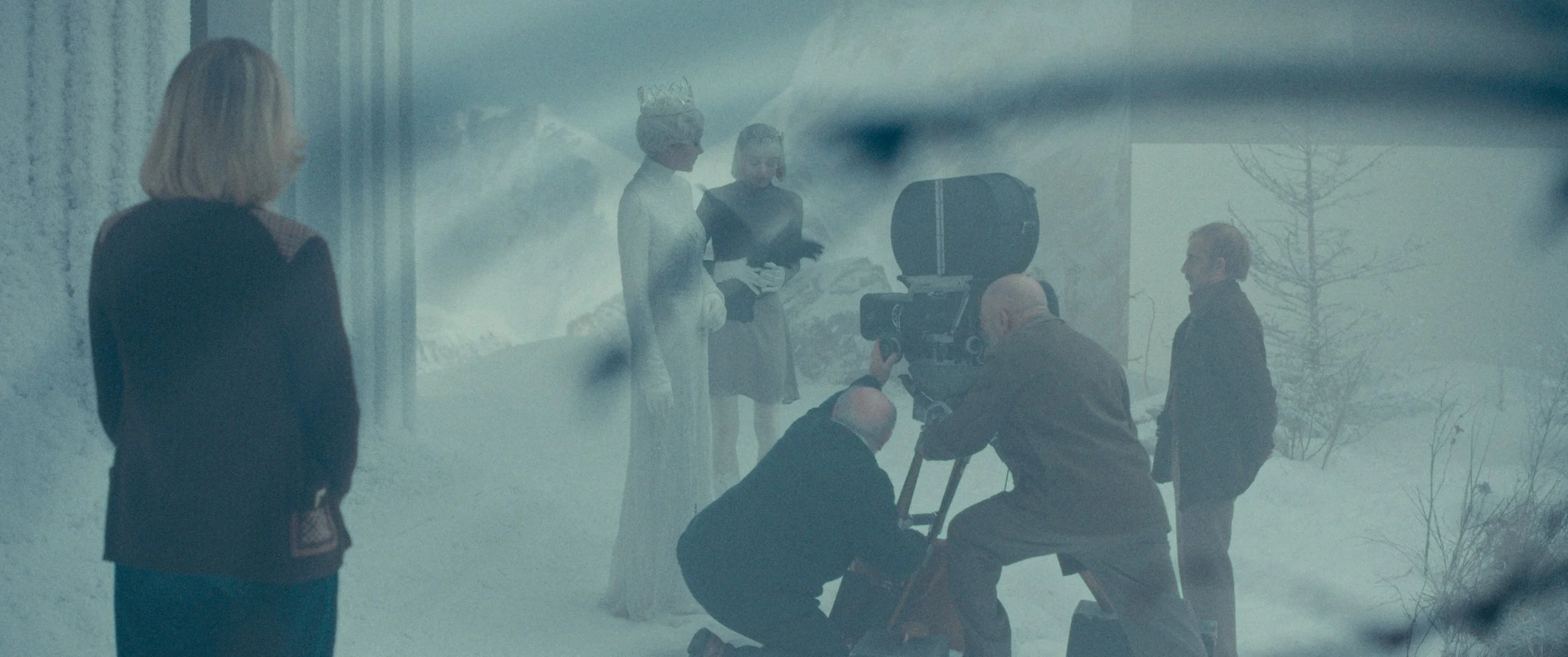‘The Ice Tower’ Review: Lucile Hadžihalilović's Hypnotizing Fantasy Drama
Thanks to a painterly sense of image-making and captivating turns from Marion Cotillard and CLARA Pacini, Lucile Hadžihalilović creates a unique atmosphere with The Ice Tower, blending the artifice of cinema with the trauma-inducing dread of a child’s fantasy.
Lucile Hadžihalilović’s The Ice Tower isn’t your conventional fairytale, nor is it a particularly welcoming picture for fans of fantasy cinema or magical realism. Instead of pulling the audience into its painterly tableaux and dreamlike aesthetic sensibilities, it actively pushes us out of a world that continuously blurs itself between the harsh reality protagonist Jeanne (Clara Pacini) lives in and the fantasy of her favorite story, Hans Christian Andersen’s The Snow Queen, visualized through the artifice of a high-budget film production.
It's also (pun absolutely intended) glacially paced – deliberately slow to the point of alienation. It may even be slower than her last (nearly unwatchable) movie, Earwig, which this critic saw at TIFF in 2021 and still has not been released in my neck of the woods. However, unlike this film, which, beyond its arresting visuals, never developed anything it introduced, The Ice Tower has such a hypnotic, trance-like quality to its structure, that your eyes are unable to look away at this rather nightmarish vision of The Snow Queen, which posits many intriguing thematic throughlines as its runtime progresses to a devastating conclusion.
It's a fascinating object. One that, I believe, few will actively enjoy, or get something out of. Each image is littered with intense significance, in Jeanne’s journey of self-actualization as she escapes her orphanage, adopts a new identity and begins to idolize the actress portraying The Snow Queen in an upcoming fantasy film, Cristina van den Berg (Marion Cotillard). Cristina has her own inner demons that will slowly unveil itself as the movie progresses, which Hadžihalilović strongly infers on during scenes where Jeanne spies the actress in her dressing room with a mysterious “doctor” named Max (August Diehl). However, when Jeanne, now adopting the name “Bianca,” meets face-to-face with Cristina, her imposing figure seems almost overwhelming for the young orphan to even utter a word.
Clashing with the director Dino (played by Gaspar Noé, who is also Hadžihalilović’s husband, in a role tailor-made for his sicko sensibilities, wearing the greatest wig you’ll ever see in a motion picture), Cristina acts as a movie star above the cheap confines of this ridiculously inert production (this is likely what she thinks). Yet, Jeanne (or Bianca)’s presence begins to intrigue her as much as Cristina intrigues Jeanne. It doesn’t take long for the protagonist to fall under Cristina’s gaze, and this is where the perfectly-calibrated fabrication of Dino’s film production starts to disassociate inside the dreams (or nightmares) of Jeanne, and where the narrative swerves in almost Lynchian directions.
It's hard to compare this film with a Lynch-directed project, although one of the review quotes from the trailer is “Frozen meets Mulholland Drive,” which may have some truth when you begin to pick apart what this entire thing means. I personally couldn’t tell you about the deeper meaning behind The Ice Tower, nor do I care. What I can describe, however, is how the movie made me feel, and it’s genuinely unlike anything Hadžihalilović has so far crafted, and also unlike anything I’ve seen in the fantasy world. It’s a genre I have difficulty grappling with, because it’s the one which can bring about many complex emotions – trauma, anxiety, dread – as the fantasy film can swerve in many unexpected, often frightening, directions that could linger with you for the rest of your life.
I’ve had my fair share of traumatic “kiddie fantasy films” in my childhood, where we, in elementary school, were exposed to disturbing images (in alleged “kids films,” think The Peanut Butter Solution and the like) at far too young of an age for our sponge-like minds to be able to process whether or not what we’re seeing exists or was a pure fabrication from a deranged filmmaker who thought this was appropriate for children and families.
The Ice Tower falls in line with exactly that feeling, one where each wondrous frame of Cristina’s larger-than-life Snow Queen is undercut by a terrifying, almost malevolent presence, which latches onto you in ways you don’t even realize until the credits appear. It’s incredible, especially in how, for the bulk of the runtime, the only atmospheric sounds you hear are the empty echoes of the film set, or the ambient music of the hotel lobby or the ice rink Jeanne spends some time in. It creates a frightening sense of tension that the movie doesn’t necessarily need to have, but holds our breaths at every turn, even during lighter sequences involving Gaspar Noé and his (intentionally) terrible wig talking about how he will become the next Alfred Hitchcock in ways that make him misunderstand why his movies stood the test of time.
However, at exact, almost mathematically precise moments, Hadžihalilović will suddenly include ethereal music that jolt us out of our trance and make us pay close attention to how Cotillard’s face changes or punctuates an already striking image to ensure our retinas will never forget what we’re seeing. It’s a film so profoundly mesmerizing that the mere thought of removing your eyes from the screen and looking elsewhere feels like eating the forbidden fruit. Your eyes need to see it from beginning to end, without pause, for your to soak in the sheer grandeur of cinematographer Jonathan Ricquebourg’s picturesque image-making, and profound intimacy of Jeanne’s story, which grows in much darker directions than the atmosphere predates.
Moreover, Marion Cotillard hasn’t given a performance as strong – both emotionally and psychologically – as the one she gives as Cristina. If you surrender yourself to Hadžihalilović’s logic, you may be inclined to think the same. There’s so much to parse in how Cotillard looks at Jeanne that even writing it in a review would be difficult to describe exactly the feeling you’ll have watching her speak with a prose as hypnotic as Hadžihalilović’s visual language. It’s in the eyes where most of her performance stuns you the most, an equal match to Pacini’s revelatory breakout turn as Jeanne, concluding on a note so moving it’ll be hard for the cynics of the world to entirely dismiss the work as anything but major.
The Ice Tower is not the easiest movie to embark in, but if you do, you’ll be rewarded – and likely blown away – by Hadžihalilović’s masterful hand at guiding you in a world that, at face-value, seems as enveloping and grandiose as Andersen’s tale. But as layers of its filmic artifice are pulled back, the true nature of The Snow Queen is revealed, and when The Ice Tower reaches this point, you’ll never be able to wash the feeling of this film away, no matter how hard you try. As a follow-up to Earwig, The Ice Tower seems to be the bounce back of the century. But as a singular work of art, it’s undoubtedly one of the decade’s most incredible fantasy films.




